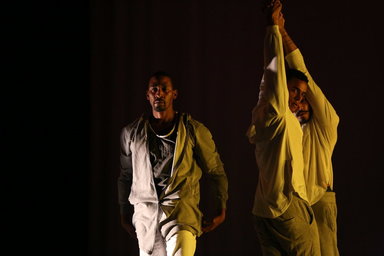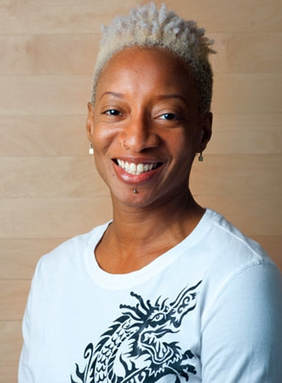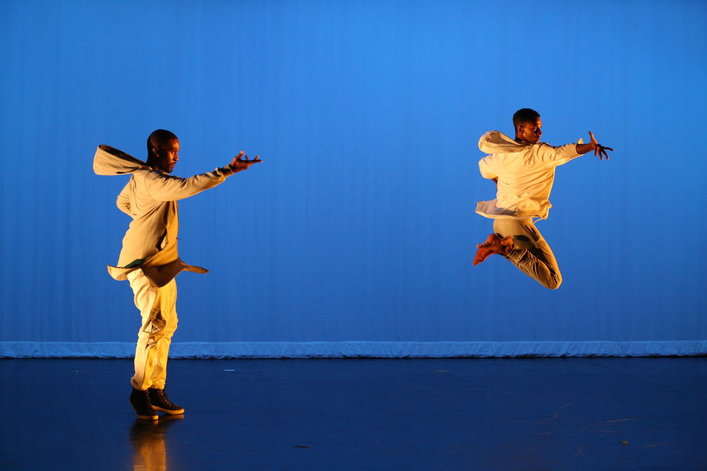 Oliver's "Virago-Man Dem Current cast of performers Niall Jones, Duane Cyrus, Jonathan Gonzalez. Not pictured: Ni'Ja Whitson. Photo: Chris Cameron
Oliver's "Virago-Man Dem Current cast of performers Niall Jones, Duane Cyrus, Jonathan Gonzalez. Not pictured: Ni'Ja Whitson. Photo: Chris Cameron In an interview, Oliver responded to some questions about the making of Virago-Man Dem.
Charmaine - For those who may not know, tell us about the germ, and definition of title Virago-Man?
Cynthia - Like so many of us, I was sick of the ways in which black men have been construed (and of course treated) in the American media. Misrepresented, stereotyped, reduced and ill regarded - We rarely see black men in their fullness, their sensitivity, sense of humor, tenderness, thoughtfulness, or any aspect that is not reduced to a caricature. And we know so much more about black men. About masculinity(ies). And as a mother with a son, I needed to offer the world something more complex, something hopeful, something that does the masculine principle justice. SO, this work is my love letter to the masculine principle in all its sparkling and glorious variety.
Virago - Man Dem, came about as I was having a conversation with a dear friend in St. Croix and she brought up the term. I hadn't heard of it and she told me (as the old folks on the islands will often do) that I needed to know it. That it meant someone for whom you couldn't exactly pin down what was up with them - a certain je ne sais quoi. I later heard the term again as a derogatory one leveled at women who behaved in a way more customary for men - bravery, brashness, forward, etc. Someone told me Lani Guinier had mentioned being called that by her father, who was from Jamaica. I took note and knew I would use it one day. I have often been regarded at home, not so much as a gender non-conformist, as a bit enigmatic and fearless (which I think is quite funny. Since I am often afraid, but have made it a personal commitment to walk toward that which I fear). So I knew the term had a place in this new work that engaged masculinities. And because I wanted to offer up a number of ways in which the masculine operates, I needed the rest of the title to indicate plurality. Dem in the Anglophone Caribbean (like saying "them") is the plural of a term, rather than changing the vowel to "men" or to put and "s" on something (i.e. apple/apples). Thus was born Virago-Man Dem, a work made by a nervy woman about a multitude of masculinities.
Charmaine - Can you talk about your Caribbean heritage and how that may have played a role in the making of this work?
Cynthia - The Caribbean always figures in my work. It is the under-riding engine of everything I do. It was the rich place of my childhood and continues to give me strength, makes me question, challenges my ideas and offers me a wellspring of myth, realities, and relationships to navigate. And the best way for me to work through anything is through my art. There are very few works of mine that have not had some Caribbean element in it.
Charmaine - The work is intended to "explore both the overt and unspoken expressions of black masculinity..." yet there are four men Duane Cyrus, Jonathan Gonzalez, Niall Noel Jones) and Ni'Ja Whitson, was this intentional?
Cynthia - There are three men and one gender non-conforming person in the work. Yes, that was intentional. The casting of the piece has gone through a lot over the past two years that we have been in process. And while I began the idea of the piece intending for there to be a gender non-conforming cast member, I didn't initially know it would be Ni'Ja. I had been in conversation with someone early on, before I had cast anyone, but when push came to shove, they were not available. I moved on. I put the word out. I knew about two members of my cast all along - Niall Noel Jones and Duane Cyrus. Both I had been in touch with and discussed working together and we seemed to be on the same page. I also knew them both because they had come to the University of Illinois as graduate students. While they were there we didn't work together for a whole host of reasons - for Duane, he had been in very demanding company environments - Ailey and Graham, and was taking grad school as time to focus on other things besides performing, and Niall came when I was recovering from cancer treatments and could not focus on anything else, although I knew I wanted to work with him one day. Jonathan came later as I began building the cast. Word of mouth led me to him as Jawole Zollar made a suggestion that I speak to him after I told her what I was trying to do and she saw who I had already enlisted. And Ni'Ja had been in my life all along, but we had never talked about working together until I realized that I was having this challenge and they were right there chatting with me about other things all during the process. It was like the Universe was saying..." Look here!" and I finally heard it. So these four folks - and I was always determined it was a quartet - are magic together. And yes, while not each person came in the same way and the same time, they all came as they were supposed to. Absolutely with intention.
Charmaine - If yes, or no, how does this decision speak to your the Caribbean "Virago-Man" image?
Cynthia - I think I have answered that above, but I will say that with Ni'Ja in the space, the Virago is not simply symbolic but is real. Prior to Ni'Ja, I was the Virago, the presence behind the scenes that might be implied in a couple of the areas of the work. With Ni'Ja in the space performing with the others, the notion of masculinity gets more expansive to move beyond biology in a visible way that my biology behind the work only indicated. Now their biology and the others call one another into question. What we designate and why gets pointed up. So perhaps in this way the whole picture becomes a bit more nuanced, more complex. and THAT I totally dig.
Charmaine - So how does a work like this begin, as you set out to answer, "...how can a woman choreograph masculinity, without resorting to stereotypes"?
Cynthia - Well this is interesting because I wanted to get beyond the stereotypes. But at the same time I know that some of us - audience and otherwise, only know such. So my interest has always been to gesture to them - the stereotypes - here and there and quickly depart, presenting something that is more expansive and porous. I think I can do this despite being born with a vagina, because I am always interested in the ways my world can be expanded, through thought, word and deed. I have known a multiplicity of masculinities that differ based on the location, cultural environment, age range, class position, street savvy or other modes of education an individual has experienced. I want to bring that breadth to this work. So I essentially knew that I could do that with the right mix of folks. The thing for me was, I wanted to answer to the folks who might only imagine one had to be born with a penis to do so. So while I am drawing on the individual experiences of the cast, I am also negotiating my own background with brothers, relatives, friends, former lovers, my child, etc. I already have a rich well from which to draw and that nostalgia, reality, myth and dream all come into play as I began making this work. Then negotiating those ideas with real people in the room was the next step.
Charmaine - Were there challenges?
Cynthia - Absolutely. The minute you work with more than just yourself, there are challenges. There is the challenge of time. Who is available when? THAT is one that was and continues to make me crazy. It is a miracle that any of this gets made at all! But then there is the challenge of negotiating everyone else's ideas about the topic and about what collaboration in it means. It means different things to different people. And I have different ideas about the multiple roles that are a part of the process and how I am imagining the fluidity of that as well. So yeah, it's all a challenge. And I wouldn't change what this process has been because the work that the audience will see next week and hopefully over the course of the next year or two is the product of rich and challenging conversations/investigations/environments that have brought about the birth of this very thing that I am quite proud of.
Charmaine - Are there high points?
Cynthia - I think so. But I will leave that to y'all to decide. I will keep mine to myself;)
Charmaine - Is there an anecdote you could share about being in the studio?
Cynthia - Naw, I will keep that as a private experience as well. That rehearsal space is a charged one ain't it?! That is where magic occurs. That is our sacred space. I will leave it up to the others to share should they so decide. I'ma keep my mouth shut. LOL
Charmaine - Are you looking forward to bringing the work to New York, and being back in New York?
Cynthia - OMG! I LOVE NYC and love coming back to the place that has nurtured my artistry for decades. My people! My people!!! Come out! Come on out and show your sista some l-o-v-e!!!
 Cynthia Oliver Photo: Val Oliveiro
Cynthia Oliver Photo: Val Oliveiro aesthetic sensibilities. She has been awarded and/or commissioned by The Jerome Foundation, The National Performance Network’s Creation Fund, The Doris Duke Multi Arts Production (MAP)Fund, New York Live Arts, among many others. Her work has been performed in festivals and venues around the US and the Caribbean . In 2012, she was invited to Oagadougou,
Burkina Faso, via the Suitcase Fund, to work with a group of 16 women dance artists, creating a choreography which spoke to their empowerment as artists negotiating complex traditions that may impede their art. In addition to Cynthia’s performance work, she holds a Ph.D. in performance studies from New York University. Her scholarly work has focused on performance
in the Anglophone Caribbean. She has taught at NYU’s Tisch School of the Arts, The Newcomb Summer Dance Intensive at Tulane University, Florida State University, Bennington College, Bates Dance Festival, and the University of Utah. She is Professor of Dance at the University of Illinois, Urbana-Champaign. Oliver was last at BAM as a performer inTere O’Connor’s
BLEED (NWF 13).
Talk: Examining Black Masculinity
With Cynthia Oliver and Nora Chipaumire
Moderated by Jaamil Olawale Kosoko
Oct 27 at 6pm
Wendy’s Subway Reading Room, BAM Fisher (Sharp Lower Lobby), 321 Ashland Pl
Free
cynthiaoliver.com
 Oliver's "Virago-man Dem" Current cast of performers Niall Jones, Duane Cyrus, Jonathan Gonzalez. Not pictured: Ni'Ja Whitson. Photo: Chris Cameron
Oliver's "Virago-man Dem" Current cast of performers Niall Jones, Duane Cyrus, Jonathan Gonzalez. Not pictured: Ni'Ja Whitson. Photo: Chris Cameron
 RSS Feed
RSS Feed